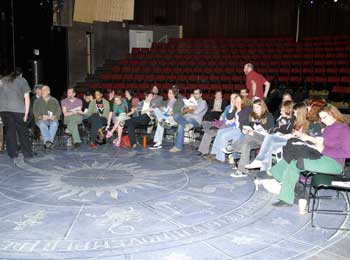About the Playwrights
The sons of an Iranian mother and a Russian father, Oleg (b. 1969) and Vladimir (b. 1974) write together under the name “The Presnyakov Brothers.” They were born and raised in the Ural Mountains city of Yekaterinburg in Siberia and attended the Gorky Ural State University. After Oleg completed graduate work in literary theory and Vladimir finished his graduate studies in psychology, both brothers remained in Yekaterinburg, where they taught at the university and ran a youth theatre company. Although the company no longer exists, it was formed out of a similar condition that continues to influence their plays -- the turmoil of Russian society and the impact of this uncertainty on the lives of citizens, particularly young adults. "In art," say the Presnyakovs, "the older generation's concerns are much better represented, and the younger generation are still trying to break through" (Marmion). Their work speaks to this youthful sensibility, in part through frank explorations of social problems that do not shy away from the depiction of violence and cruelty. Their desire to capture the language and characters of everyday life is one reason they continue to reside in Yekaterinburg. As Oleg explains, "Our works are written essentially in the language of the people we live among" (Zarakhovich).
Although the brothers still call Yekaterinburg home, their plays now travel the world, as do they. Bad Bed Stories, Terrorism and Captive Spirits have been produced at theatres in Moscow, such as the Playwright and Director Center and the Moscow Art Theatre, and published in a Russian anthology. Terrorism was translated, performed and published by the Royal Court Theatre in 2003. It was also produced by the Studio Theatre in Washington D.C. and the Play Company in New York. A film version of Playing the Victim, for which they wrote the screenplay, won the prize for best film at the Rome Film Festival. They subsequently re-wrote that play to incorporate new characters and plot twists. The brothers have a penchant for remaking their works in this manner. According to Vladimir, "Playing with our characters again and again lets us see how their situations are developing" (Zarakhovich). Between their original work and the rewritten versions of their plays, the brothers claim to have lost track of how many plays they have written. But according to their British agent, Judy Daish, those plays have had tremendous worldwide impact. She claims that the brothers have become the most frequently staged Russian playwrights after Anton Chekhov. "There isn't a day that their plays are not performed someplace the world over," says Daish. The brothers are pleased at the international appeal of their work. As Oleg puts it, “The best thing is when, in São Paolo or Budapest, Stockholm or Toronto, people come up and say, 'Hey, you've expressed just what I have on my mind, what really bothers me'" (Zarakhovich).
Works Cited
Zarakhovich, Yuri. “Two for the Road.” Time. Time.com, 17 Dec. 2006.
Web. 6 Nov. 2009. Marmion, Patrick. “Chekhov’s Children.” The Times (London).
LexisNexis Academic. 20 Jan. 2003. Web. 5 Nov. 2009.
Robyn Quick
Russia Season Dramaturg

The audience gathers for a developmental reading of Playing Dead at Towson University. November 2009. Photo: Robyn Quick



